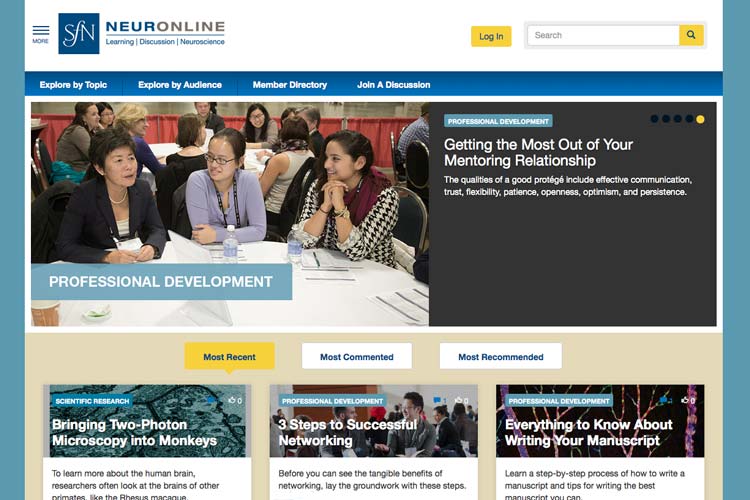
A Career in Scientific Publishing: A Different Type of Passion
Editor’s Note: This article is part of an NQ series highlighting career paths for neuroscientists. Read the introductory article for an overview of the diverse range of career opportunities available to neuroscientists and how the field is addressing the evolving career and training landscape. Read the Fall 2015 article “Government Careers: Serving the Public and Science” to learn more about opportunities in government research and science policy.
Sometimes a deep fascination with science doesn’t turn into an academic career. That’s what Emilie Marcus, editor of Cell and editor-in-chief of Cell Press, discovered when she was a postdoctoral fellow in neuroscience.
“I heard that things were looking good for me to get funding that I had applied for, but I wasn’t excited,” Marcus said. “If you’re going into academic research, and you’re not excited on the day someone’s giving you money, then you’re probably in the wrong field.”
Marcus spent the next several months weighing her options before deciding that while she wasn’t going to be an academic scientist, she wouldn’t be happy in a field where people weren’t also interested in science. That’s when she saw an ad for an editor at Neuron and decided to explore entering the field of scientific publishing.
“I personally really like the breadth of science,” said Marcus, who also serves on SfN’s Global Membership Committee. “That’s one of the things that led me to think about a career in publishing.”
Katja Brose, editor-in-chief for Neuron, agreed that the best part of her job is engaging with people who are also passionate about science.
Opportunities in Publishing
For those who love science but can’t see themselves pursuing an academic career, science publishing may offer opportunities that they can feel passionate about.
“There are a lot of jobs within the publishing industry,” said Brose, who completed her graduate training with neuroscientist Marc Tessier-Lavigne when he was teaching at the University of California, San Francisco. “There are jobs like mine at primary research journals where you're really managing papers going through the peer-review process.” People can also look for jobs as book editors and multimedia editors, she added.
Editors at a peer-reviewed journals read submitted papers, select those most suited for the publication, and oversee the review and revision process. All of that requires communicating with authors and reviewers throughout the process.
While working as a book acquisitions editor, Jasna Markovac developed book and journal projects for publishers ranging from Raven Press to Academic Press to Elsevier. In her current role as senior adviser for publishing and related business development at the University of Michigan, she comes up with book or online ideas and finds the best people to make that project happen. Developing those ideas also means continually interacting with scientists.
“This career forces you to keep up with science,” Markovac said. “And you get to do that by keeping in touch with the best people in the field.”
Johannes Menzel, director of segment content at Elsevier, has focused much of his career on electronic publishing because he enjoys the challenge of solving technical problems. At Academic Press, he served as the interface between traditional publications and the online world when the company began a project to provide electronic journals to all English universities. “It required a lot of communication with internal and external editors to get them excited about the online versions of the journals,” Menzel said. “Initially, that wasn’t easy.”
Skills to Develop: Networking and Business Acumen
Many of the skills acquired during PhD training prove fundamental to a career in publishing. “The first thing you learn in training to be a PhD or master’s student is how to problem solve,” Marcus said. “You also learn to make data-driven decisions.”
Doctoral training also builds skills such as collaboration and project management, which help an editor look at the different aspects of a project and make it all come together at the right time. The ability to extract scientific information quickly from complex presentations and texts is another useful skill in scientific publishing.
However, careers in science publishing also require people to develop aptitudes that aren’t necessarily cultivated in a PhD program. Markovac pointed out that editors and publishers must be comfortable approaching and engaging with the “superstars” of the field. ”The best content for new book and journal projects comes from conversations where you just talk to people about their work,” Markovac said. “You anticipate the needs of a particular field. And, the only way to do that is knowing the key people in a field and interacting with them.”
In addition, scientific journal editors work closely with authors to shepherd manuscripts through to publication, and that requires diplomacy and maturity, according to Brose and Marcus.
“You’re responsible for making decisions that matter for people’s lives,” Marcus said. That’s exciting when someone publishes their first paper. But, it can be “high pressure, intense, fast-paced. Everyone wants their decision now, today. Sometimes you have to explain to people why you can’t move forward with their paper, and you have to be strong to do that.”
A career in science publishing also means developing business acumen. The health of a publishing house depends on the success of its projects, Markovac said, noting that meeting targets is a critical component of an editorial career.
“It can be risky. And that’s not everyone’s cup of tea,” Menzel said. Still, he noted that people who enjoy exploring interesting opportunities will find a lot of them in publishing. In his own career, he has developed online journals databases, been an acquisitions editor, and managed the development of electronic content for large publishing houses. “All of my jobs have been a new type of position,” he said. “I really like the fringes.”
Exploring Publishing Careers
Menzel’s career path is not what he envisioned when he started studying biology. That’s a characteristic he shares with Brose, Marcus, and Markovac. Still, all have discovered that the opportunities afforded them in scientific publishing have led to intellectually rewarding careers.
Scientists interested in publishing can explore that career path in a variety of ways. Markovac recommended talking with a lot of different people in scientific publishing, including the major publishing houses. She also suggested looking into association publishing and serving on publishing committees such as those at the Society for Neuroscience.
“Talk to people at your university,” said Markovac, who serves on SfN’s Professional Development Committee. “Talk to people at the publishing houses like Elsevier, Wiley, and Springer; talk to people who work for [scientific] societies,” she said, noting there are many ways to get insight into scientific publishing. “I encourage people to test it out however they can. Consider internships,” she said.”
Scientific publishing may not have been on the horizon when she started graduate school, but Marcus has found her career can inspire envy. “People come up to me — Nobel laureates have come up to me — and say, ‘You have the best job in the world. I want your job. It’s all the pure intellectual aspects of science.



















